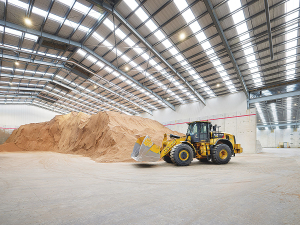More stockfood options on menu
Swap Stockfoods has operated in the South Island for a while now but has opened a new site in Christchurch that will give more stockfood options to farmers in Canterbury, the West Coast and further north.
 At the peak, palm kernel went to over $500/ton but it’s now in the mid $300’s, according to J Swap Contractors.
At the peak, palm kernel went to over $500/ton but it’s now in the mid $300’s, according to J Swap Contractors.
After the volatility of recent years, stockfood prices and availability have now stabilised, according to J Swap Stockfoods general manager Morgan Swap.
Two major external factors – Covid-19 and then the Russian invasion of Ukraine – drove the grain market sky high, but the market has now settled, says Swap.
“Generally speaking, feed prices didn’t move much during the first 6-12 months of Covid, then we had that bit of a sugar rush. Initially Covid didn’t have much impact on prices, then prices started to go up as freight and logistics costs started to rise.
“And then we had the second big surge in prices of ag commodities when Russia invaded Ukraine, which drove everything ballistic. So we had that double surge in prices, but since then, things have been sinking back down to more normal levels.”
At the peak, palm kernel went to over $500/ ton but it’s now in the mid $300’s and Swap says it has been even lower than that.
“Palm kernel was one of the ones to come down first, and there’s a reason for that. It went up like a sky rocket, post the invasion; the EU is still the largest market for palm kernel. Russian grain is very important, the invasion sent grain prices through the roof and the traders all looked to everything else and thought ‘we’ve got to get covered real quick’, which drove up all grain prices.
“So it’s sort of settled back down since, across the board. Your co-products like tapioca, NZ maize, Australian wheat, DDGs – they’re back to multi-year lows. A lot of the other products are settling down also. Things like soya bean meal are always volatile, but our core products are definitely more stable now on price.”
Swap says, while J Swap Stockfoods haven’t imported any more palm kernel over the last year than normal, as a percentage of what’s being fed to cows, the proportion of palm compared to co-products has increased, just through straight economics, because it was cheap compared to everything else.
“As much as people – consultants and the like – talk about palm kernel being ‘old hat’, if the other co-products are more expensive, and the gap between them is big enough, they do flock back to palm kernel.
“So, what we’ve seen in the last 12 months is, the farmer that was feeding 60% palm and 40% co-products, went to 70%-30% or 80%-20% to bring the average price down.
“This is the first season for 5-6 years when the co-products part of the mix didn’t grow, and that was just economics. It could now drift back in the direction it was heading.
“Palm kernel you could buy for under $300 and all the co-products were still up in the $500- 600 range or higher, then the dairy payout went down, which exacerbated the trend. Farmers were definitely watching their spend.”
On the availability front, Swap says there certainly don’t seem to be any issues. “It doesn’t appear that there’s any great shortage of any of the main products. Price will come into it, and some products may not always be available at the price some farmers may want, but supply is okay.”
The mix of what farmers are ordering comes down to the total price of the ration, he says.
As for regional demand, he says J Swap’s sales data, by region, closely tracks areas where feed has been short. “As a generalisation, central North Island, encompassing the Waikato, BoP and the King Country, has grown a reasonable amount of grass this season, but pockets of NZ have suffered. North Canterbury has been under the pump and having to buy in more feed. South Taranaki and parts of the Manawatū have had a bit of a tough end to their season too.”
Former Fonterra executive Alex Turnbull has been appointed CEO to lead all five Yili Oceania Business Division companies in New Zealand.
Fonterra executive René Dedoncker is leaving the co-operative later this year to lead Australian agribusiness Elders.
Alliance Group and the Southland Stags rugby team have joined forces in a partnership that will see the the meat co-operative's farmgate brand feature on players' team kits and replica jerseys.
Fonterra's plan to expand its organic programme to the South Island is being well received by farmers, the co-op says.
Voting has started for the renewal of DairyNZ's milksolids levy.
The most successful catchment groups in NZ are those that have 'a source to sea' approach.
OPINION: A dairy version of fantasy football has been launched.
OPINION: In recent weeks beaches in Auckland, Wellington and Christchurch have been unsafe to swim in because of recent heavy…